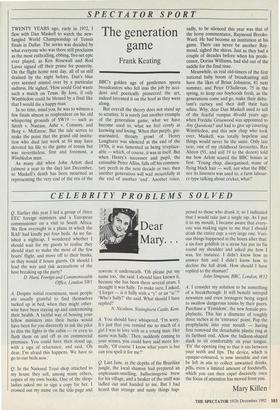SPECTATOR SPORT
The generation game
Frank Keating
TWENTY YEARS ago, early in 1972, I flew with Dan Maskell to watch the new- fangled World Championship of Tennis finals in Dallas. The series was decided by what everyone who was there still proclaims as the most enthralling, ebbing, five-set epic ever played, as Ken Rosewall and Rod Laver signed off their prime for posterity. On the flight home next day, all of us still drained by the night before, Dan's blue eyes seemed misted over by a particular sadness. He sighed, 'How could God waste such a match on Texas. By Jove, if only Wimbledon could be blessed by a final like that I would die a happy man.'
In no time, mind you, he was to witness a few finals almost as resplendent on his old whispering grounds of SW19 — such as Smith v. Nastase, Ashe v. Connors, and Borg v. McEnroe. But the tale serves to make the point that the grand old institu- tion who died last week at 84 may have devoted his life to the game of tennis but was nevertheless, first and foremost, a Wimbledon man.
As many did when John Arlott died (almost a year to the day) last December, so Maskell's death has been mourned as representing the very end of the era of the BBC's golden age of gentlemen sports broadcasters who fell into the job by acci- dent and poetically pioneered the art, indeed invented it on the hoof as they went along.
But overall the theory does not stand up to scrutiny. It is surely just another example of the generation game, what we have become used to, what we feel comfy at knowing and loving. When that purply, gin- marinated, throaty growl of Henry Longhurst was silenced at the end of the 1970s, it was lamented as being irreplace- able — which, of course, it was in itself. But when Henry's successor and pupil, the estimable Peter Alliss, falls off his commen- tary perch in the next decade or two, then another generation will wail mournfully at the end of another 'end'. Another voice, sadly, to be silenced this year was that of the horsy commentator, Raymond Brooks- Ward. He had become an institution at his game. There can never be another Ray- mond, sighed the shires. Just as they had a couple of decades before when his prede- cessor, Dorian Williams, had slid out of the saddle for the final time.
Meanwhile, us real old-timers of the first national baby boom of broadcasting still have the likes of Brian Johnston, 81 next summer, and Peter O'Sullevan, 75 in the spring, to keep our boyhoods fresh, as the generations come and go, make their debu- tant's curtsey and then doff their hats adieu. Why, dear Dan Maskell used to tell of the fearful rumpus 40-odd years ago when Freddie Grisewood was appointed to Any Questions? and had to give up covering Wimbledon, and this new chap who took over, Maskell, was totally hopeless and things would never be the same. Only last year, one of my childhood favourites, Rex Alston (91, and still 19 to the dozen) told me how Arlott scared the BBC bosses at first: 'Young chap, disorganised, mane of flying black hair — well, not what the BBC nor its listeners was used to, a farm labour- er-type talking about cricket, what?'










































































































 Previous page
Previous page